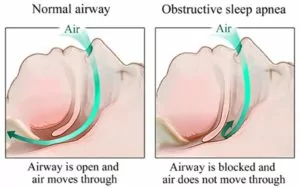 A formal diagnosis of obstructive sleep apnea—the medical condition that temporarily halts breathing during sleep because the upper airway is blocked—requires a sleep study either in the lab or at home. However, there is now research to show that the anatomy of your throat and mouth may be indicative of the condition. Read on to find out how your tonsils, your tongue and uvula may tell your dentist that a sleep study should be scheduled.
A formal diagnosis of obstructive sleep apnea—the medical condition that temporarily halts breathing during sleep because the upper airway is blocked—requires a sleep study either in the lab or at home. However, there is now research to show that the anatomy of your throat and mouth may be indicative of the condition. Read on to find out how your tonsils, your tongue and uvula may tell your dentist that a sleep study should be scheduled.
Large Tonsils Increase the Risk of Sleep Apnea
The conclusions of a study conducted at the University of Dammam College of Dentistry in Saudi Arabia were published in the Saudi Medical Journal. Researchers examined 200 patients in clinics and also had them fill out the Berlin Questionnaire, which screens for obstructive sleep apnea, or OSA. In addition, common risk factors including neck circumference, body weight and blood pressure were considered. Finally, the researchers also looked at the size of a patient’s tonsils, tongue and uvula.
The findings showed that 23 percent of the participants were at risk for OSA, and 80 percent of those were male. Moreover, having large tonsils and tongue indentations—caused by teeth imprints, which may mean the tongue is too large for the mouth—as well as a larger than normal uvula increased the risk.
What Do the Findings Mean for You and Your Dentist?
With this knowledge, your dentist may be able to alert you to the possibility that you have OSA based only on the appearance of your tonsils and tongue. This type of screening can easily be performed during a regularly scheduled dental checkup and prevent some cases from going undiagnosed. With this knowledge, dentists can recommend visiting a sleep specialist or provide a home sleep study if they diagnose and treat sleep disorders.
How Is Sleep Apnea Treated?
Up until fairly recently, the only treatment for obstructive sleep apnea was a CPAP (continuous positive air pressure) machine. Unfortunately, many patients wouldn’t use a CPAP nightly because they couldn’t tolerate the forced air or the mask proved to be too uncomfortable.
Now, however, there is an alternative your dentist can provide. Both sleep apnea and snoring can be treated with an oral appliance that shifts your jaw slightly forward in order to prevent your tonsils, tongue and other throat tissue from blocking your airway. The appliance is comfortable, convenient and easy to clean. Your dentist may be able to help you get a good night’s sleep!
Meet the Doctors
Both Dr. David Vaca and Dr. Chris Kirby are members of the American Sleep and Breathing Academy. Together, they offer appropriate treatment for sleep apnea at Vaca & Kirby Dental in Longview, TX. Call the office today to schedule an evaluation.







